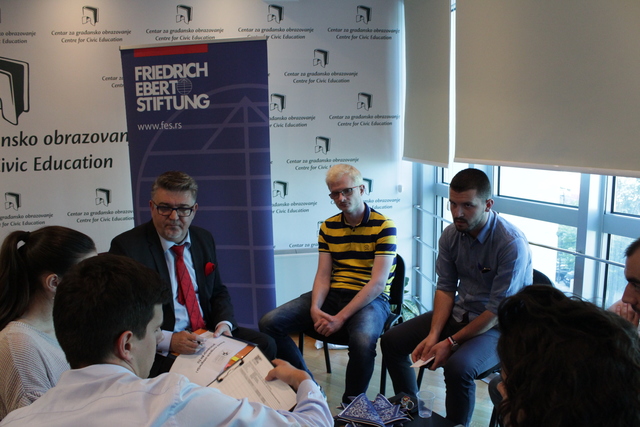Centre for Civic Education (CCE) today organised tenth European café, in cooperation with Friedrich Ebert Stiftung (FES), in the great hall of CCE. Within this event, H.E. Veselko Grubišić, ambassador of Republic of Croatia in Montenegro, talked with representatives of high school and student organisations, as well as with youth organisations and youth wings of political parties about European standards and Montenegro – whether conditionality yields the results?.
Daliborka Uljarević, CCE Executive director, assesswed at the opening of tenth European café that aspiring countries to EU membership are in the middle of a long and demanding process of internal transformations of society, which can be seen through the challenges on the path to application of Euroepan standards. “European standards are increasingly becoming a moving target, but that must not be discouraging for all those who seek to join the EU. Montenegro should adopt those standards and apply them primarily for its own benefit, so that it could create the basis for the society of functional rule of law, system of responsibility in every branch of government, inclusiveness with regards to diversity and improvement of quality of citizens’ lives. This would consequently lead to opening of much greater opportunities for young people, which are one great, yet still underestimated, resource of this society”, she pointed out. “In this regard, Croatia’s experience is highly valuable. Its lessons should serve Montenegro as guidelines for successful and easier advancement towards the union of European states”, added Uljarević.
Ambassador reminded that Croatia has gone through the negotiation process very similar to the one that Montenegro is going through, and that Croatia is determined to transfer that knowledge and skills to Montenegro. He particularly commended “such strong participation of Montenegrin NGO sector in this process. Internal transformations of society can be significantly accelerated through the process of negotiations and continued based on the membership in European Union. Old saying “Panta rhei”, i.e. that in this world “only constant is change”, perhaps best desrcribes the state of some society when its state joins the European Union, hence, there is no ultimate goal when it comes to changes. Then you find yourself in an exclusive club which helps you further improve yourself in terms of the prosperity and values of the society, thereby not rejecting the traditional values of our citizens from Croatia or Montenegro, such as hospitality, kinship and etc. All in all, we should preserve our hospitable nature and continue helping our family, but avoid nepotism when doing so. Our young people are precisely the carriers of these changes”, explained Grubišić.
When asked whether conditionality yields the results, he told that “at first, it seemed hard when benchmarks were introduced prior to the opening of certain chapters. However, as process progressed, those benchamrks became the goals that we were able to meet in a tangible manner, hence we reasonably asked for the opening and closing of certain chapters when we completely met the required tasks. It would appear that those benchmarks for opening and closing of certain chapters increased the transparency of process, but also served as a landmark during the process of negotiations”, assessed Grubišić.
“Four years of membership in the EU has provided a better position in international relations. Croatian has become one of the official languages of European Union. I believe that the increase of tourists is related to our membership in EU and NATO. Croatia’s membership in EU almost certainly contributed to increase of industrial production and export”, concluded Grubišić.
The objective of European café is the creation of platform for open and fruitful informal discussion which would contribute to the improvement of cooperation between different social groups and institutions, intensify the communication, identify the existing challenges and define the proposals for their overcoming, as well as inform on special aspects of process of accession of Montenegro to EU, hence a part of this event was dedicated to discussion on the role of young people in these processes.
CCE began with the project Europan café two years ago, during which it organised meetings between the representatives of civil society, on one side, and national and international decision-makers within the process of accession on the other. As of 2017, European café is being organised for young people as well. Previous guests of European café were: Mitja Drobnič, then Head of the EU Delegation to Montenegro, Aleksandar Andrija Pejović, Chief negotiator for the conduct of accession negotiations on of Montenegro to EU, Gudrun Elisabeth Steinacker, then ambassador of FR Germany in Montenegro and Zoran Pažin, Minister of Justice in the Government of Montenegro and Vice President of Government of Montenegro, followed by the representatives of opposition of civic affiliation – Miodrag Lekić, President of DEMOS, Aleksa Bečić, President of Democrats of Montenegro and Dritan Abazović, President of United Reform Action (URA) – with whom we spoke about the European values, and whether the same exist in Montenegro, and in which manner the opposition advocates them. Our guest list also includes Jozo Radoš, MEP and member of the European Union – Montenegro Stabilization and Association Parliamentary Committee (SAPC), Milivoje Katnić, Chief Special Prosecutor in Montenegro with associates, and finally, Roman Hloben, ambassador of Republic of Slovakia in Montenegro, and Hans Günther Mattern, ambassador of FR Germany in Montenegro.
Next European café is planned for the autumn of 2017.
Svetlana Pešić, programme associate

